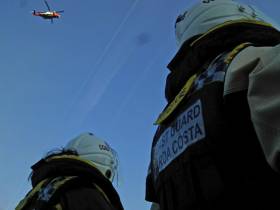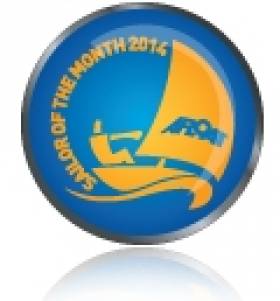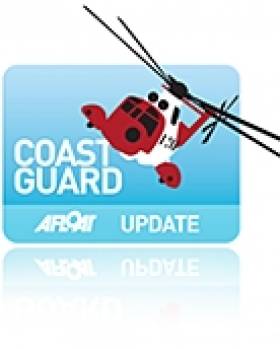Displaying items by tag: Sutton
Ancient GP 14 Dinghy Gets Flowery Final Flourish
Those intrepid spirits who venture westward on the road from the Most Serene Republic of Howth through Sutton Cross, and on into the wilds of nearby Ireland, always used to look forward to the first glimmering glimpse of Sutton Creek and Dublin Bay on their left.
This comes with the long panorama of the Wicklow Hills blending into the Dublin Mountains beyond, book-ended by the distinctive peak of the Sugarloaf Mountain to the east, while westward the stopper is the double exclamation mark (“screamers” as we call them in the verbiage business) of the two Poolbeg Smokestacks. They smoke no longer, but sentimental Dubs won’t let them go, as they see them as essential to the scene, even if they did make mighty objections when their construction started in 1974
 Whither, O splendid ship? Outward bound with all flowers set towards the Poolbeg Smokestacks. The Poolbeg Twins don’t make smoke any more, but Dubliners, having furiously objected when they were built in 1974, now object with equal fury to any plan to demolish them. Photo: W M Nixon
Whither, O splendid ship? Outward bound with all flowers set towards the Poolbeg Smokestacks. The Poolbeg Twins don’t make smoke any more, but Dubliners, having furiously objected when they were built in 1974, now object with equal fury to any plan to demolish them. Photo: W M Nixon
This up-lifting wide-screen vista appears as you emerge from behind the shoreside line of properties now known as Millionaires’ Row. It wasn’t always thus, as the location close along a southwest-facing shoreline made older properties very sad-looking indeed if maintenance slackened.
But since Rainfall Radar and its various accessories arrived, the Sutton Cross area has emerged as the driest place in all Ireland, something previously unknown when the only statistics came from official mechanical gauges in relatively rain-swept places like the People’s Park in Dun Laoghaire.
THE DRYEST PLACE IN IRELAND
Sutton Cross - the Howth Peninsula’s isthmus or tombolo - is not Ireland’s sunniest place, for that’s still Wexford. But as news spread on the grapevine about scientific recognition of the lack of rain along Sutton’s south shore, the cute ones started buying up the properties, many of which were in the tired state of a house that’s been in one family for several generations.
Renovations and re-buildings got under way, while sensible folk created a wind-break of escallonia up and growing as soon as possible to keep the worst effects of the salty sou’westers at bay. On the road side, meanwhile, the appearance of wide gateways funneling into a solid hardwood automated gate confirmed the up-graded status.
 Vista for a lifetime. Even on a winter’s day of limited visibility, the Sutton-viewed panorama to the southwest of the skyline from the Sugarloaf to the Smokestacks evokes thoughts of “over the hills and far away.” Photo: W M Nixon
Vista for a lifetime. Even on a winter’s day of limited visibility, the Sutton-viewed panorama to the southwest of the skyline from the Sugarloaf to the Smokestacks evokes thoughts of “over the hills and far away.” Photo: W M Nixon
As one who feels that the best houses are those that cannot be seen from a public road, I could not demur. But it did mean that the first glimpse of the bay and the mountains beyond as you put Millionare’s Row astern was even better appreciated. Until, that is, a distraction was introduced by some well-meaning souls who felt it needed the ornamentation of a herbaceous plot of brightly-coloured flowers, almost garish, in fact, and they’re all in a tightly packed display.
It’s reasonable enough as an idea. But when a retired GP 14 dinghy is used as the flower-pot, we enter a different word of distracted drivers and confused thinking. We’ve always had mixed thoughts about the widespread habit – not necessary just in coastal area – of using de-commissioned boats as flower beds. However, a GP 14 dinghy is something else altogether, for superficially she seemed in quite good shape, but any traces of a boat name or builder’s plate has been removed to ensure anonymity.
SCRAPPAGE FROM SUTTON DINGHY CLUB?
So everyone will assume that she was taken as scrap from the boat-park at Sutton Dinghy Club a mile or so along the coast. Thus the little boat’s fate seems all the more sad, for as you look nor’east across her, visible in the distance is Sutton DC with its dinghy park alive with masts flashing in the sun, its vibrant if distant presence emphasising the flowerbed boat’s completely de-commissioned state.
Yet what do we do with old boats that have gone past their useful years as seaworthy sailing vehicles? It’s maybe better that decisions such as seeking out a landfall site are postponed over days and weeks. After all, James Dwyer of Royal Cork YC’s wonderful classic 1976 Bruce Farr-designed Half Tonner Swuzzlebubble is now a successful and life-enhancing presence around Crosshaven.
Yet not so many years ago, she was in Greece and destined for an Athens land-fill, but fortunately the owner lacked that vital tool for action, the Round Tuit, and there was time for Swuzzlebubble to be saved by Mordy of Cowes.
 James Dwyer’s classic Half Tonner Swuzzlebubble of 1976 vintage is a life-enhancing presence at the Royal Cork YC in Crosshaven, yet only a few years ago she was saved from a landfill fate in Greece. Photo: Robert Bateman
James Dwyer’s classic Half Tonner Swuzzlebubble of 1976 vintage is a life-enhancing presence at the Royal Cork YC in Crosshaven, yet only a few years ago she was saved from a landfill fate in Greece. Photo: Robert Bateman
But the problem with a GP14 is she’s “only a dinghy”. Larger craft lend themselves to more stately ends. Back in 1968 I was returning from Spain on a solo coastal cruise around South Brittany, and called into Camaret, which in those days was very busy traditional fishing port in which cruising yachts were just about tolerated.
These days, the situation is almost exactly reversed, as the fishermen have been removed to a nearby commercial purely fishing port, and Camaret trades for tourists and cruising boats on the charms of the characterful harbour they left behind.
But in 1968, it was the real McCoy, with the solemn tradition that the old Tunnymen – some of them still with much evidence of their sail-driven past – were not broken up, but rather all re-usable gear was removed, and they were given their final resting place in ancient dignity on a foreshore beside the harbour, and there boat anoraks like me could wander reverentially around, savouring the lines of some of the best working sailing hulls ever created.
 The End Game. Retired Tunnymen were achieving a certain dignity in 1968 in their final resting place on the foreshore at Camaret harbour. Photo: W M Nixon
The End Game. Retired Tunnymen were achieving a certain dignity in 1968 in their final resting place on the foreshore at Camaret harbour. Photo: W M Nixon
We can’t see that happening with an old GP 14, but nevertheless you’d be forgiven for thinking that a new life as a flower-bed is a fate worse than death. GP14 means General Purpose 14ft dinghy. But even that very positively-minded genius Teddy Haylock, the longtime ideas-laden Editor of Yachting World magazine who got Jack Holt to make the GP 14 the corner-stone YW’s growing list of Build-Her-Yourself in 1949, can scarcely have imagined it would become a red-hot racing class with worldwide appeal.
GP? DOES IT MEAN GIANT PLANT-POT?
Thus it’s unlikely that you could persuade the many hundreds – thousands even – who continue to think that the GP14 is the bee’s knees to even think it’s slightly amusing if you suggested that GP can also be the anagram for Giant Plant-pot.
Nevertheless, it would surprise few of us if someone, temporarily traffic-jammed beside the flower-pot GP14 as kids pour out of the local high school, began to bethink to themselves of restoring it to full sailing condition, despite the fact that they wouldn’t have noticed it at all in its deteriorating state in the dinghy park.
Either way, can you imagine a flower-filled Shannon One Design at the roadside to welcome you to Athlone? Or a similarly-arrayed Water Wag in the approaches to Dun Laoghaire?
Howth Coastguard Team Rescues Dog from Sutton Sea Cliff
Howth’s Irish Coast Guard cliff team sprang into action yesterday evening (Sunday 16 May) to rescue a dog trapped on a sea cliff at Red Rock in Sutton.
Freddie the dog had fallen 10 metres down the cliff face while walking with his owners and was stranded on a ledge in the rock.
The coastguard team acted quickly, setting up for an abseil before a rescue climber was lowered to retrieve Freddie and safety reunite him with his relieved owners on the beach below.
“Freddie’s owners did the right thing when the dog got trapped. They didn’t attempt a self rescue and contacted the coastguard on 999,” the Howth unit said.
“We encourage the public to contact the coastguard if they see people attempt a rescue.”
#Skibbereen - TheJournal.ie reports that a 14-year-old boy is in critical condition after he was struck in the head by a boom while yachting off Skibbereen yesterday morning (Saturday 24 June).
The teenager was airlifted to Cork University Hospital by the Irish Coast Guard helicopter Rescue 117, and the latest news from Independent.ie is that his condition was improving.
Elsewhere yesterday, Howth Coast Guard attended a 53-year-old man with serious head injuries sustained while kitesurfing off Sutton in North Co Dublin.
And Shannon’s Rescue 115 was called to Inis Mór in the Aran Islands for the medevac of a woman who suffered spinal injuries while taking part in the Red Bull Cliff Diving World Series event.
Sutton’s Old Coastguard Station Transformed Into Home Of The Future
#WaterfrontProperty - Sutton’s former coastguard station has been utterly transformed into a fashionable home for the future, as The Irish Times reports.
Nadia and Mack Lennon purchased 1 Martello Terrace in the North Co Dublin suburb in 2014 and since then have overseen its conversion from a virtual museum of the area’s coastal heritage — as maintained by its previous owner, a pillar of the sailing community — to a modern open-plan family home.
Yet even as the Lennons use terms like “nostalgic coastal” and “bourgeois eclectic” to describe their vision, the house — now on the market for €995,000 through Gallagher Quigley — retains a number of its original features, as well as some rescued from other parts of coastal Dublin.
The Irish Times has much more on the story HERE.
Sutton Dinghy Club's Andy Johnston is December's Sailor of the Month
#sailorofthemonth – Sutton Dinghy Club on the north shore of Dublin Bay has been a pace-setter in the revival of Irish dinghy racing and club activity generally during 2014. Commodore Andy Johnston led his members through an outstanding season in which they were once again making an impact at national and international level, while the club's training programme and sailing school under the direction of Hugh Gill was highly effective in bringing newcomers to the sport, and building up a strong esprit de corps among its dedicated team of young instructors. In addition to success in open dinghy events at all levels, SDC succeeded in regaining the historic Book Trophy for team racing from Royal Cork Yacht Club.
The trophy dates back to 1944, but for the past sixteen years the sailors of Crosshaven had kept it firmly in their grasp. 2014 also marked the 75th Anniversary of the foundation of the club at its homely base beside Sutton Creek, so the concluding highlight of the year was a 75th Anniversary Gala Dinner in mid-November in the club's home-from-home, the popular Marine Hotel at Sutton Cross. A remarkable total of 204 well-wishers and people who have distinguished sailing connections with Sutton DC from way back attended.
It was Ciara O'Tiarnaigh and her Organising Committee who looked after the nuts and bolts of this star-studded event, but throughout a long and very special season, it was Andy Johnston who led the way and held the ultimate responsibility. Nevertheless, in making him our Sailor of the Month for December 2014, we are saluting the spirit of Sutton Dinghy Club, and the resilience of all Irish dinghy sailing.
This Friday Last Day for 2012 Fingal Lifeguard Applicants
#WATER SAFETY - This coming Friday 30 March is the closing date for applications for Fingal County Council beach lifeguards for the 2012 summer season.
Lifeguard cover will be provided on Fingal beaches on weekdays and weekends 11am to 7pm from 2 July till the last week of August, depending on weather and staff levels.
Beaches and bathing places scheduled to be guarded this summer include Balbriggan (front beach), Skerries South, Loughskinny, Rush North and South Shores, Portrane (Tower Bay and The Brook), Donabate, Malahide, Portmarnock, Sutton (Burrow Road) and Howth (Claremount).
Applicants must be not less than 17 years of age on 1 May 2012. Application forms are available to download HERE.
Dublin Bay Mudflat Rescue Caught on Video
A Dubliner had a lucky escape after being stranded on mudflats between Baldoyle and Sutton Point, on Dublin Bay last week.
The man had sunk waist-deep in mud on a low tide and was unable to free himself. Dublin Fire Brigade was tasked to the scene along with the Howth Coast Guard unit. The Youtube clip of the entire incident is below.
Rescue helicopter 116, which was already on the ramp at Dublin Airport in preparation for a training exercise, was also tasked at 16.18pm according to a report on the the SAR Ireland blogspot.
After obtaining permission to cross the 'Live' runway at Dublin airport, R116 was on scene within minutes and quickly identified the man who was described as wearing 'dark clothing'. He was quickly winched to safety and returned to Dublin Airport at 16.36pm, where he availed of crew facilities to clean himself down and arrange transport home.
More on Dublin Bay here




























































